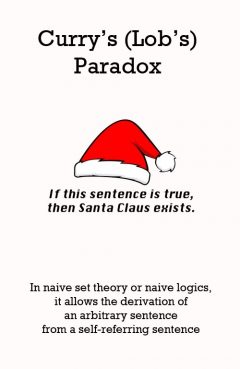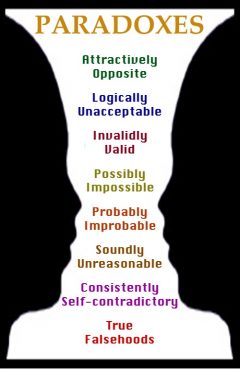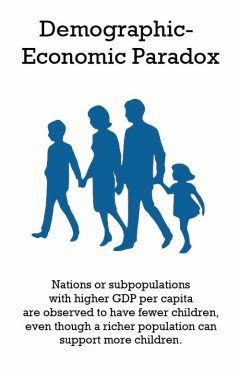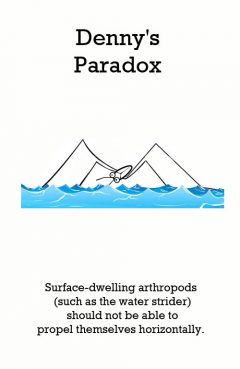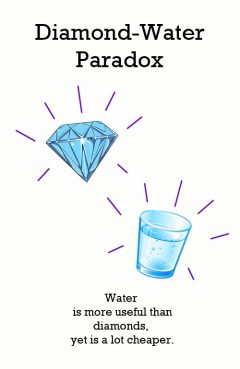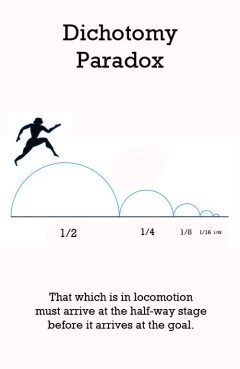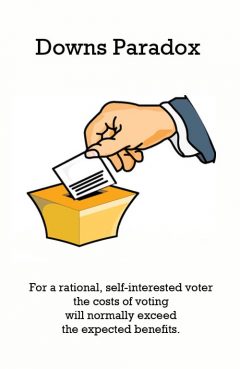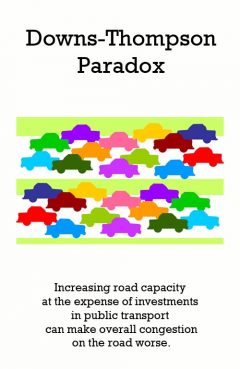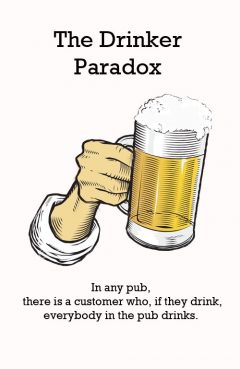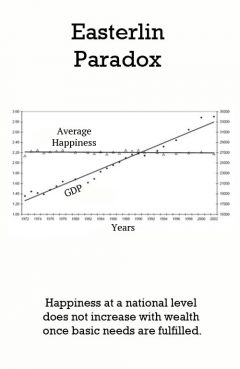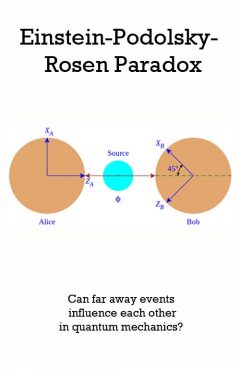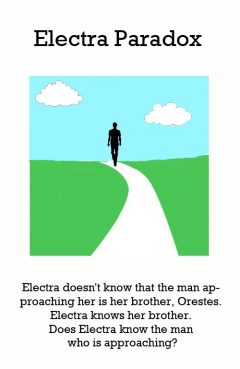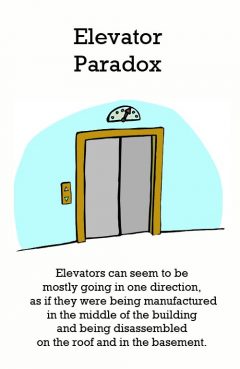Curry's Paradox
Release Date: //
Country of Release:
Length:
MPAA:
Medium: Paradox
Genre:
Release Message: If this sentence is true, then Santa Claus exists. Authored by Haskell Curry.
Description: Curry's paradox is a paradox that occurs in naive set theory or naive logics, and allows the derivation of an arbitrary sentence from a self-referring sentence and some apparently innocuous logical deduction rules. It is named after the logician Haskell Curry. While naive set theory fails to identify it, a more rigorous examination reveals that the sentence is self-contradictory. Flaws in accepted reasoning
D'Alembert's Paradox
Release Date: //1752
Country of Release:
Length:
MPAA:
Medium: Paradox
Genre:
Release Message: Flow of an inviscid fluid produces no net force on a solid body.
Description: In fluid dynamics, d'Alembert's paradox (or the hydrodynamic paradox) is a contradiction reached in 1752 by French mathematician Jean le Rond d'Alembert.[1] D'Alembert proved that for incompressible and inviscid potential flow the drag force is zero on a body moving with constant velocity relative to the fluid.[2] Zero drag is in direct contradiction to the observation of substantial drag on bodies moving relative to fluids, such as air and water; especially at high velocities corresponding with high Reynolds numbers. It is a particular example of the reversibility paradox.[3]
Demographic-Economic Paradox
Release Date: //
Country of Release:
Length:
MPAA:
Medium: Paradox
Genre:
Release Message: Nations or subpopulations with higher GDP per capita are observed to have fewer children, even though a richer population can support more children.
Description: Nations or subpopulations with higher GDP per capita are observed to have fewer children, even though a richer population can support more children.
Denny's Paradox
Release Date: //
Country of Release:
Length:
MPAA:
Medium: Paradox
Genre:
Release Message: Surface-dwelling arthropods (such as the water strider) should not be able to propel themselves horizontally. Authored by Mark Denny.
Description: In the study of animal locomotion on the surface layer of water, Denny's paradox refers to the apparent impossibility of surface-dwelling animals such as the water strider generating enough propulsive force to move.
Diamond-Water Paradox (Paradox Of Value)
Release Date: //
Country of Release:
Length:
MPAA:
Medium: Paradox
Genre:
Release Message: Water is more useful than diamonds, yet is a lot cheaper.
Description: The paradox of value (also known as the diamond_water paradox) is the apparent contradiction that, although water is on the whole more useful, in terms of survival, than diamonds, diamonds command a higher price in the market. The philosopher Adam Smith is often considered to be the classic presenter of this paradox, although it had already appeared as early as Plato's Euthydemus. Nicolaus Copernicus, John Locke, John Law and others had previously tried to explain the disparity.
Diaphragmatic Paradox
Release Date: //
Country of Release:
Length:
MPAA:
Medium: Paradox
Genre:
Release Message: During respiration, the diaphragm moves opposite to the normal directions of its movements.
Description: Diaphragmatic paradox or paradoxical diaphragm phenomenon is an abnormal medical sign observed during respiration, in which the diaphragm moves opposite to the normal directions of its movements. The diaphragm normally moves downwards during inspiration and upwards during expiration. But in diaphragmatic paradox, it moves upwards during inspiration and downwards during expiration.
Diary of Tristram Shandy
Release Date: //
Country of Release:
Length:
MPAA:
Medium: Paradox
Genre:
Release Message: Taking a year to thoroughly document each day of his life, only by living forever could no moment remain unwritten.
Description: The diary of Tristram Shandy[edit source | editbeta] Tristram Shandy, the hero of a novel by Laurence Sterne, writes his autobiography so conscientiously that it takes him one year to lay down the events of one day. If he is mortal he can never terminate; but if he lived forever then no part of his diary would remain unwritten, for to each day of his life a year devoted to that day's description would correspond.
Dichotomy Paradox
Release Date: //-460
Country of Release:
Length:
MPAA:
Medium: Paradox
Genre:
Release Message: That which is in locomotion must arrive at the half-way stage before it arrives at the goal. Authored by Zeno.
Description: That which is in locomotion must arrive at the half-way stage before it arrives at the goal._ as recounted by Aristotle, Physics VI:9, 239b10 ii. The Dichotomy (The Racetrack) In his Progressive Dichotomy Paradox, Zeno argued that a runner will never reach the stationary goal line of a racetrack. The reason is that the runner must first reach half the distance to the goal, but when there he must still cross half the remaining distance to the goal, but having done that the runner must cover half of the new remainder, and so on. If the goal is one meter away, the runner must cover a distance of 1/2 meter, then 1/4 meter, then 1/8 meter, and so on ad infinitum. The runner cannot reach the final goal, says Zeno. Why not? There are few traces of Zeno's reasoning here, but for reconstructions that give the strongest reasoning, we may say that the runner will not reach the final goal because there is too far to run, the sum is actually infinite. The Standard Solution argues instead that the sum of this infinite geometric series is one, not infinity. Suppose Homer wishes to walk to the end of a path. Before he can get there, he must get halfway there. Before he can get halfway there, he must get a quarter of the way there. Before traveling a quarter, he must travel one-eighth; before an eighth, one-sixteenth; and so on. This description requires one to complete an infinite number of tasks, which Zeno maintains is an impossibility. The dichotomy This sequence also presents a second problem in that it contains no first distance to run, for any possible (finite) first distance could be divided in half, and hence would not be first after all. Hence, the trip cannot even begin. The paradoxical conclusion then would be that travel over any finite distance can neither be completed nor begun, and so all motion must be an illusion. An alternative conclusion, proposed by Henri Bergson, is that motion (time and distance) is not actually divisible. This argument is called the Dichotomy because it involves repeatedly splitting a distance into two parts. It contains some of the same elements as the Achilles and the Tortoise paradox, but with a more apparent conclusion of motionlessness. It is also known as the Race Course paradox. Some, like Aristotle, regard the Dichotomy as really just another version of Achilles and the Tortoise.[11] There are two versions of the dichotomy paradox. In the other version, before Homer could reach the end of the path, he must reach half of the distance to it. Before reaching the last half, he must complete the next quarter of the distance. Reaching the next quarter, he must then cover the next eighth of the distance, then the next sixteenth, and so on. There are thus an infinite number of steps that must first be accomplished before he could reach the end of the path. Expressed this way, the dichotomy paradox is very much analogous to that of Achilles and the tortoise.
Double-Slit Experiment
Downs Paradox (Paradox of Voting)
Release Date: //
Country of Release:
Length:
MPAA:
Medium: Paradox
Genre:
Release Message: For a rational, self-interested voter the costs of voting will normally exceed the expected benefits, so why do people keep voting?
Description: For a rational, self-interested voter the costs of voting will normally exceed the expected benefits, so why do people keep voting?
Downs-Thompson Paradox
Release Date: //
Country of Release:
Length:
MPAA:
Medium: Paradox
Genre:
Release Message: Increasing road capacity at the expense of investments in public transport can make overall congestion on the road worse.
Description: Increasing road capacity at the expense of investments in public transport can make overall congestion on the road worse.
The Drinker Paradox (aka Drinker's Paradox,The Drinker's Principle, or the Drinking Principle)
Release Date: //1978
Country of Release:
Length:
MPAA:
Medium: Paradox
Genre:
Release Message: In any pub there is a customer who, if they drink, everybody in the pub drinks. Authored by Raymond Smullyan.
Description: The drinker paradox (also known as drinker's principle, drinkers' principle or (the) drinking principle) is a theorem of classical predicate logic, usually stated in natural language as: There is someone in the pub such that, if he is drinking, everyone in the pub is drinking. The actual theorem is where D is an arbitrary predicate. The paradox was popularized by the mathematical logician Raymond Smullyan, who called it the "drinking principle" in his 1978 book What Is the Name of this Book?
Easterlin Paradox
Release Date: //
Country of Release:
Length:
MPAA:
Medium: Paradox
Genre:
Release Message: For countries with income sufficient to meet basic needs, the reported level of happiness does not correlate with national income per person. Authored by Richard Easterlin.
Description: Easterlin is in particular known for his 1974 article "Does Economic Growth Improve the Human Lot? Some Empirical Evidence" and the Easterlin paradox which he stated there, namely that, contrary to expectation, happiness at a national level does not increase with wealth once basic needs are fulfilled. He is also known for the Easterlin hypothesis, which states that the positive relationship between income and fertility is dependent on relative income (income relative to aspirations).
Edgeworth Paradox
Release Date: //
Country of Release:
Length:
MPAA:
Medium: Paradox
Genre:
Release Message: With capacity constraints, there may not be an equilibrium.
Description: In economics, the Edgeworth paradox describes a situation in which two players cannot reach a state of equilibrium with pure strategies, i.e. each charging a stable price. Suppose two companies, A and B, sell an identical commodity product, and that customers choose the product solely on the basis of price. Each company faces capacity constraints, in that on its own it cannot satisfy demand at its zero-profit price, but together they can more than satisfy such demand. Francis Ysidro Edgeworth (F. Y.)
Ehrenfest Paradox
Release Date: //
Country of Release:
Length:
MPAA:
Medium: Paradox
Genre:
Release Message: Inconsistencies related to the kinematics of a rigid, rotating disk.
Description: The Ehrenfest paradox concerns the rotation of a "rigid" disc in the theory of relativity. In its original formulation as presented by Paul Ehrenfest 1909 in the Physikalische Zeitschrift,[1] it discusses an ideally rigid cylinder that is made to rotate about its axis of symmetry. The radius R as seen in the laboratory frame is always perpendicular to its motion and should therefore be equal to its value R0 when stationary. However, the circumference (2-R) should appear Lorentz-contracted to a smaller value than at rest, by the usual factor _. This leads to the contradiction that R=R0 and R<R0.
Einstein-Podolsky-Rosen Paradox (EPR Paradox)
Release Date: //
Country of Release:
Length:
MPAA:
Medium: Paradox
Genre:
Release Message: Can far away events influence each other in quantum mechanics? Authored by Albert Eilnstein, Boris Podolsky and Nathan Rosen.
Description: The EPR paradox is an early and influential critique leveled against quantum mechanics. Albert Einstein and his colleagues Boris Podolsky and Nathan Rosen (known collectively as EPR) designed a thought experiment intended to reveal what they believed to be inadequacies of quantum mechanics. To that end they pointed to a consequence of quantum mechanics that its supporters had not noticed. Physical
Electra Paradox
Release Date: //
Country of Release:
Length:
MPAA:
Medium: Paradox
Genre:
Release Message: Electra doesn't know that the man approaching her is her brother, Orestes. Electra knows her brother. Does Electra know the man who is approaching? Authored by Eubulides.
Description: Electra doesn't know that the man approaching her is her brother, Orestes. Electra knows her brother. Does Electra know the man who is approaching?
The Elevator Paradox
Release Date: //1958
Country of Release:
Length:
MPAA:
Medium: Paradox
Genre:
Release Message: Elevators can seem to be mostly going in one direction, as if they were being manufactured in the middle of the building and being disassembled on the roof and basement. Authored by Marvin Stern and George Gamow.
Description: Gamow, who had an office near the bottom of the building noticed that the first elevator to stop at his floor was most often going down, while Stern, who had an office near the top, noticed that the first elevator to stop at his floor was most often going up.
Elevator paradox (physics)
Release Date: //
Country of Release:
Length:
MPAA:
Medium: Paradox
Genre:
Release Message: Even though hydrometers are used to measure fluid density, a hydrometer will not indicate changes of fluid density caused by changing atmospheric pressure.
Description: The elevator paradox relates to a hydrometer placed on an "elevator" or vertical conveyor that, by moving to different elevations, changes the atmospheric pressure. In this classic demonstration, the floating hydrometer remains at an equilibrium position. Essentially, a hydrometer measures specific gravity of liquids independent of barometric pressure. This is because the change in air pressure is applied to the entire hydrometer flask. The submerged portion of the flask receives a transmitted force through the liquid, thus no portion of the apparatus receives a net force resulting from a change in air pressure. This is a paradox if the buoyancy of the hydrometer is said to depend on the weight of the liquid that it displaces. At a higher barometric pressure, the liquid occupies a slightly smaller volume, and thus more dense might be considered to have a higher specific gravity. However, the hydrometer also displaces air, and the weight of the liquid and the air are affected equally by elevation.
Ellsberg Paradox
Release Date: //
Country of Release:
Length:
MPAA:
Medium: Paradox
Genre:
Release Message: People exhibit ambiguity aversion (as distinct from risk aversion), in contradiction with expected utility theory.
Description: The Ellsberg paradox is a paradox in decision theory and experimental economics in which people's choices violate the expected utility hypothesis. One interpretation is that expected utility theory does not properly describe actual human choices. It is generally taken to be evidence for ambiguity aversion. The paradox was popularized by Daniel Ellsberg, although a version of it was noted considerably earlier by John Maynard Keynes. Ellsberg raised two problems: 1 urn problem and 2 urn problem. Here, 1 urn problem is described, which is the better known one.
